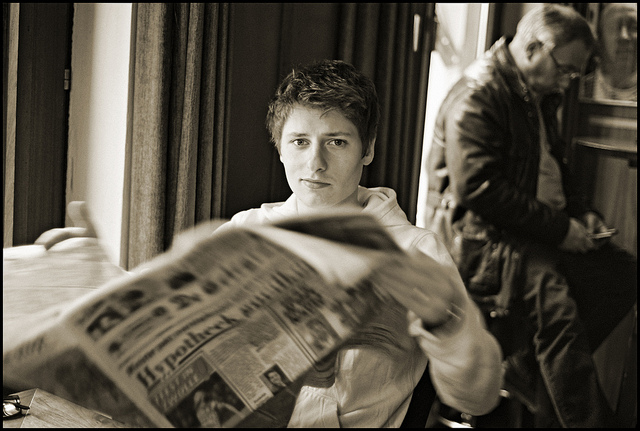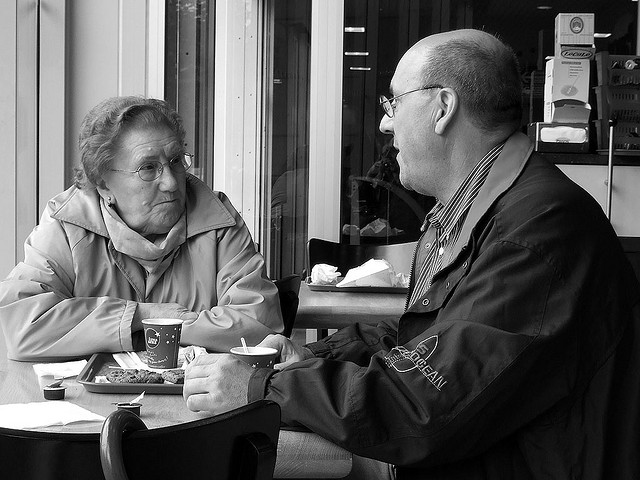 Somewhere in the deep pits of my mind, I still think of “scientists” as remote people whose sentences I won’t understand, and of “science” as an incomprehensible body of knowledge I have to memorize. This is probably also the public’s image of science. But if 1000 years as a science writer have taught me nothing else, it’s 1) that science is the way people think when they’re admiring their worlds, when they’re thinking of explanations of their worlds that they can most reliably believe. And 2) that scientists are just specially-educated versions of the guys in the coffee shops.
Somewhere in the deep pits of my mind, I still think of “scientists” as remote people whose sentences I won’t understand, and of “science” as an incomprehensible body of knowledge I have to memorize. This is probably also the public’s image of science. But if 1000 years as a science writer have taught me nothing else, it’s 1) that science is the way people think when they’re admiring their worlds, when they’re thinking of explanations of their worlds that they can most reliably believe. And 2) that scientists are just specially-educated versions of the guys in the coffee shops.
On the way into my usual coffee shop this morning, I looked at the nice crossing guard across the street. She saw that I looked at her and waved. I wondered how she knew I was looking at her. The coffee shop was too noisy to concentrate on my magazines, so I asked John and Larry about the crossing guard. Why can people too far away to see your eyeballs know that you’re looking at them? John and Larry are regulars who leave right at 8:00; they’re always dressed for the weekend. “Maybe you stop moving your head,” said John, supplying the hypothesis. “Maybe having your head still and facing one way is noticeable.” “I think that’s right,” said Larry, supplying possible confirming evidence. “Look at cats. Look at people looking at something you can’t see but now you want to and you look too.”
§
The women in the coffee shop over by the window use their outdoor voices and sitting across the small room from them, I can hear every word they say whether I want to or not and I never want to. They’re always like this. My hypothesis: the women are trying to impress each other or are competing so they’re playing for an audience. I politely wait until the women leave, then I tell Larry and John my hypothesis but they don’t think much of it; they’re not into the psychology of the individual. Instead they see I have a problem and figure out their own hypothesis: I’m distracted by conversation. John’s office doesn’t have cubicles, he says, it’s open, and “pink noise” works. “What hooks you into somebody’s conversation is the rhythms of the sentences,” he says, “and if enough people are talking that the sentences overlap and you don’t hear a rhythm, you can ignore it.”
§
One regular is open about the psychoses he lives with. He knows everybody’s name – “Hello, Ann,” he always says — and seems to appreciate the coffee shop for its company, its social reassurance. Once when he went off his meds and the counter kids couldn’t figure out how to calm him down and get him help, they called the cops, and the cops came in like thunder, clearing the tables out of the way; and another regular walked in and assessed the scene and said, “Hey, man! Let’s go to the hospital!” so they quietly did. A couple weeks later, two game-designers in the coffee shop were talking about this regular. “He says he’s moving up to Pennsylvania,” says one young game-designer. “I think he needs a regular community. How is he going to find a regular community like this?” The other game designer didn’t have an answer.
§
The regulars are amateurs compared to the little neighbor kid, aged 5 or 6, who lives across the street. She’s walking barefoot on the conglomerate sidewalk, paying attention to every step. “Mama,” she says, “these bumps on the sidewalk. How does my brain know about these bumps in the sidewalk? My toes feel them. But how do my toes tell my brain? How does my brain know what my body is doing?”
§
I’m not saying these people are doing science, only that they’re thinking like scientists, asking questions and proposing answers that could be turned into science. I’m saying that if you want to know the origins of science, you can just hang around coffee shops and conglomerate sidewalks.
_______
Photos: wwwuppertal; Squonk11, both via Flickr

Wow! That was fantastic. As a scientist, I thank you for expressing it so clearly.